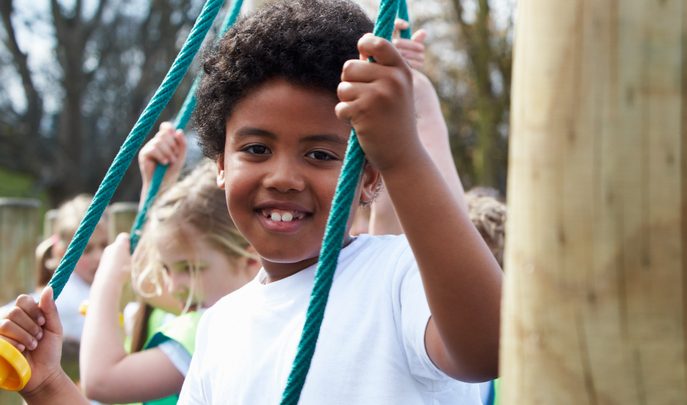“As A Young, Black Man Working In Pastoral Care, I’m Used To People Being Surprised”

Ahead of this year's International Men's Day on 19th November, Deji Olaniyi-Maxwell writes about being one of few young, black men working in pastoral care…

When you think of a school support worker, who do you imagine? Chances are, probably not someone who looks like me.
As a young, black man working in the profession, I’m used to people being surprised when they find out what I do. But while the shortage of male teachers is often talked about, no-one acknowledges the shortage of men in pastoral care.
Despite it being rare, I’ve found that having my demographic variables – young, black, male – can actually be a blessing. On a basic level, I understand the slang the children use and the social context they operate in. If there’s a meme or a trending dance that they’re referring to, I can think of ways to engage them – one example being the ‘Whip/Nae Nae’ dance-a-thon we organised for Sport Relief, which the children all loved.
I can also relate to the children on a deeper level. As well as organising coffee mornings, arranging home visits, overseeing safeguarding case work, assisting with ESOL courses, employment workshops and more, I also take responsibility for lunchtime ‘football interventions’ at the school.
We had a problem with fighting in the playground, which I found could be avoided by organising football matches to keep the children busy. I use the sessions to teach challenging pupils that you control your own fate (if you play well and behave, you stay on; if not, you’re benched) and the importance of discipline and teamwork. While demographics wouldn’t matter in an ideal world, I doubt the sessions would go down as well with the hardest to engage pupils if they weren’t coming from me.
The ‘Oldest, coolest kid’
Many of the pupils don’t see me in the same way that they see other school staff. I’m close enough to their age that they still think of me as the ‘Oldest, coolest kid’ they go to school with, rather than another adult, but there’s still enough of an age gap to command respect.
Children listen to me because they don’t see me as a traditional authority figure – who to them are usually older, white and female. Some children simply won’t listen to such figures; they have it embedded in them not to listen to women.
They have no male role models and their mothers have lost control of them. Because children are often very aware of the demographic issue, they will then not respect other women’s authority. They will, however, relate to people with the same demographic variables as them, and their mothers know this. I’ve heard some ask their children, “Don’t you want to be like Mr Maxwell when you’re older?”
Of course, there are challenges. Some children will try to talk to me in the same way they would with their friends. They might think they can’t get in trouble with me, as I’m ‘Too cool’ to punish them. I’ve had children try to play fight with me too, which they would never try to do with a female member of staff. When I begin working with children, I try to be firm and assertive from the start so they know where the boundaries are.
Some ethnic minority parents will see white teachers as working against them, which can be an opportunity for me to help. On one occasion a child disclosed some information that prompted children’s Social Services to advise us not to let the child leave with their father at the end of the school day, until they could come and question him.
When the father arrived, the school’s assistant head – who is a white woman – delivered the message. He became very angry and defensive, shouting, “This is because I’m black, my child is black, and you’re white”. I entered the room because I didn’t want to leave the assistant head alone with him, and repeated her message. He took it much better coming from me.
When he was asked to leave the child with us temporarily, he requested that the child stay with me, rather than with the assistant head. While all staff should be respected equally, I try not to judge parents who feel defensive around white members of staff; it’s possible that their attitudes are built up from past negative experiences.
Respect and stereotypes
Surprisingly, most of the issues I’ve had have been with colleagues. I previously worked at a school where the headteacher wasn’t part of my hiring process, and when he met me, I could tell he wasn’t impressed. At another school, a teacher once loudly asked me whether I was on work experience. I was willing to ignore this as ‘banter’, but when they were disrespectful again, I asked to have a word with them.
The school had a behaviour grading scheme that included the levels, ‘expected’, ’emerging’ and ‘exceeding’. I said to the teacher, ‘You don’t expect someone at my age to be in my position, so I’m ‘exceeding’ your expectations. You’ve reacted by showing me disrespect. What does that say to the pupils you’re telling to exceed your expectation of behaviour?’
I went on to explain that it might have been a single joke, but they don’t know how many times I’d been on the receiving end of that joke or similar comments. I had to prevent that kind of attitude from becoming acceptable and getting passed onto parents.
Staff members act totally different to me when they find out I have a Masters in clinical psychology. I can tell that this surprises them and increases their respect for me, but it really shouldn’t make a difference. We ought to respect each other regardless, due to our mutual positions at the school.
I’ve never had any negative comments from other staff regarding me being male, though. If I do get anything, it’s always from people who don’t work in schools. For many, pastoral care will always be seen to be more of a ‘woman’s job’, due to society’s beliefs that women are more maternal and better at looking after children.
What we need to do is to get over the idea of it being somehow negative to want to do a stereotypically feminine role. As I’ve found through the work I do, a man will be able to go down some avenues that a woman can’t, and vice versa. It’s important that both men and women are working in the role.
For the pupils who attend my school, maybe some of the boys will grow up and want to do it. They’ve had a role model in me, after all – and I do believe that children have to see it to be it.
Deji Olaniyi-Maxwell has four years’ experience in pastoral care and support services, and is currently a School-Home Support practitioner at a London primary school; for more information, visit www.schoolhomesupport.org.uk or follow @shsorguk







